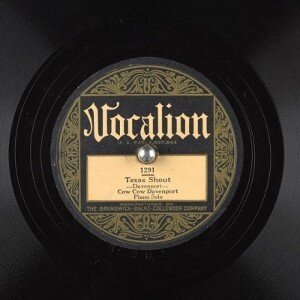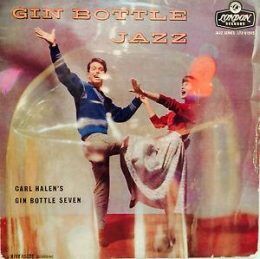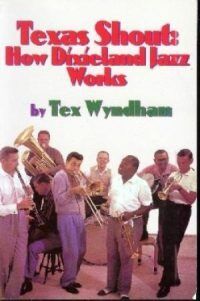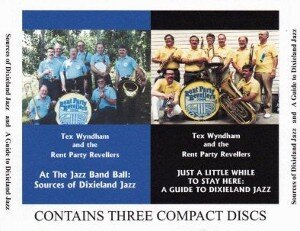 Set forth below is the eleventh “Texas Shout” column. It first appeared in the October 1990 issue of The West Coast Rag, now known as The Syncopated Times, as the concluding segment of a two-part article about record reviewing that began in the preceding issue. (The first section was reprinted August 20th, 2018.) The text has not been updated.
Set forth below is the eleventh “Texas Shout” column. It first appeared in the October 1990 issue of The West Coast Rag, now known as The Syncopated Times, as the concluding segment of a two-part article about record reviewing that began in the preceding issue. (The first section was reprinted August 20th, 2018.) The text has not been updated.
Here’s how the process goes from my end: Each review copy I receive gets two spins before I start to write. First, I play my cornet along with it — you can learn some amazing things about a recording by “sitting in”. Next, usually after several days have passed (or weeks, if there are a lot of records ahead of it on my review shelf), I sit down with earphones and take detailed notes on everything I hear — and I break the listening session into at least two parts to try to give the album time to work on me. Then, a day or two later, I take my notes to a word processor and write, rewrite, edit and re-edit, striving to find terms that capture exactly what I’m thinking.
Space constrictions are severe in this business. Most Dixieland publications are too small, and have too many available records to cover, to allow a reviewer the luxury of discussing each track or each player individually. My longest reviews rarely exceed four paragraphs. Currently, The Mississippi Rag prefers audiocassette reviews to be capsules — one paragraph per tape.
 Finally, before submission, my wife Nancy reads over what I’ve written. Although she usually has not yet heard the album, she understands jazz well and is good at catching possible ambiguities in phrasing or awkward structure that might cloud the meaning of what I’ve tried to say. The words and ideas are always mine, but like any piece of published writing, they benefit from discussion with a good editor.
Finally, before submission, my wife Nancy reads over what I’ve written. Although she usually has not yet heard the album, she understands jazz well and is good at catching possible ambiguities in phrasing or awkward structure that might cloud the meaning of what I’ve tried to say. The words and ideas are always mine, but like any piece of published writing, they benefit from discussion with a good editor.
Anyone planning to try his hand needs to keep in mind that you can’t review many Dixieland or ragtime records for very long without spending a lot of time reviewing the work of people you know, often close friends who are performers, producers, or otherwise deeply attached to the recording. This situation is no fun, believe me, because it often produces a no-win choice for the reviewer. Is it seemly to say anything at all negative about the product of your friends? Yet, can you live with telling that reader out there, who’s counting on you to give him advice that’s useful in dealing with his constricted record-buying budget, anything other than your honest opinion of the recording?
 Some reviewers will not review recordings by their friends. Over the years, I have, on rare occasions, received a review copy directly from another reviewer with a note asking me to review the album. In those cases, it’s usually clear from the situation that the other reviewer was avoiding the prospect of giving less than a rave review to his friends’ release. Trying to treat my reviewing professionally, I think it is unprofessional to refuse to do your job, particularly when someone close to the record has specifically asked you to write it up.
Some reviewers will not review recordings by their friends. Over the years, I have, on rare occasions, received a review copy directly from another reviewer with a note asking me to review the album. In those cases, it’s usually clear from the situation that the other reviewer was avoiding the prospect of giving less than a rave review to his friends’ release. Trying to treat my reviewing professionally, I think it is unprofessional to refuse to do your job, particularly when someone close to the record has specifically asked you to write it up.
Some reviewers will not write unfavorable reviews. They concentrate on the positive aspects of the record, and leave it at that. Personally, I think that this “all records are good ones” approach does not supply the record-buying public with the sort of honest, balanced, information it needs.
 Most artists and producers take criticism in stride. They know that the readers will understand that a reviewer’s opinion is still, no matter how well-informed, only one person’s view. They also know that there is no record or artist destined to receive unqualified praise from every commentator. Finally, they realize that the reviewer’s remarks are usually applicable only to one specific recording and should not necessarily be interpreted to mean that the reviewer would say the same thing about the artist on a more general basis.
Most artists and producers take criticism in stride. They know that the readers will understand that a reviewer’s opinion is still, no matter how well-informed, only one person’s view. They also know that there is no record or artist destined to receive unqualified praise from every commentator. Finally, they realize that the reviewer’s remarks are usually applicable only to one specific recording and should not necessarily be interpreted to mean that the reviewer would say the same thing about the artist on a more general basis.
Along those lines, I can’t help digressing at this point to cite George Buck, who owns what is probably the largest active catalog of older-style jazz recordings ever assembled, as an example of someone who takes a thoroughly professional attitude regarding reviewers. I recall a conversation with George in which I expressed an interest in reviewing one of his new releases. George responded that the record wasn’t one of his best ones, but he’d be happy to send it to me for review. When I hesitated to face the up-front probability of doing a review that seemed likely to be negative, George pressed his offer more strongly, saying that, if he released an album with weaknesses, he deserved to have reviewers say so. For my money, there’s someone who takes the long view, and the right view too, in terms of educating the public to recognize and look for the best.
 Now a word about the Record Review Police, the most relentless and merciless organization ever known. The RRP has operatives throughout the world, and it always gets its man, no matter how long it takes.
Now a word about the Record Review Police, the most relentless and merciless organization ever known. The RRP has operatives throughout the world, and it always gets its man, no matter how long it takes.
The RRP scans every word in a published record review for factual errors. Let’s say, for example, that I have said the reed player on an obscure vintage recording sounds like Adolphe Sax. If there is any shred of evidence anywhere in the universe to indicate that it is not Sax, the RRP will root it out and trumpet it before the world, usually in a “Letter To The Editor” that starts about like this: “Doesn’t that Tex Wyndham know anything? A collector in Paris showed me, during my trip there thirty years ago, an interview with Sax which appeared in the February 1935 issue of the Bombay Jazz Club Newsletter in which Sax clearly states that he was vacationing in Antartica at the time that recording was made …”.
 The RRP do, however, keep all of us on our toes, and that’s to the good. I maintain a sizeable shelf of jazz reference works simply to avoid the vengeance of the RRP (including each successive edition of the standard discographies). Though I have not always been able to run the RRP’s gauntlet successfully, I think my batting average is as high as the next reviewer’s.
The RRP do, however, keep all of us on our toes, and that’s to the good. I maintain a sizeable shelf of jazz reference works simply to avoid the vengeance of the RRP (including each successive edition of the standard discographies). Though I have not always been able to run the RRP’s gauntlet successfully, I think my batting average is as high as the next reviewer’s.
Even beyond the RRP, I have received mail “correcting” information that was right in the first place. I had mentioned, based on recently-unearthed evidence regarding Jelly Roll Morton’s date of birth (which still represents the latest accepted thinking on the subject, but which was not specifically cited by me in my review), Jelly’s age at the time of his first recording. Shortly thereafter, I received a letter from a fan who assured me in friendly terms that Jelly was actually somewhat younger than I had stated.
Aside from correction of facts, reviewers don’t get much follow-up mail, and almost all of that is argumentative. The person who sent you the album will sometimes drop you an amiable note to acknowledge the publication of a favorable review, but fans virtually never write you to tell you that they agree with what you have said in a record review. The relatively few letters usually come when you have touched a nerve by stating an opinion at variance with someone’s.
 I’m an active correspondent, but there is a type of letter to which I do not normally respond — one that is written solely to register disagreement with what I’ve said in a review. I figure that I’ve had my say in the review, my reader is entitled to his say in his letter, so we’re as even as we’re going to get and let’s stop there.
I’m an active correspondent, but there is a type of letter to which I do not normally respond — one that is written solely to register disagreement with what I’ve said in a review. I figure that I’ve had my say in the review, my reader is entitled to his say in his letter, so we’re as even as we’re going to get and let’s stop there.
In closing, having taken the time at the top of this column to tell you why I feel qualified to write record reviews and to express opinions about them, I think it’s only fair to balance the scales by presenting the position of someone who feels somewhat differently about my efforts. Thus, I will leave you with an excerpt from a February 27, 1984 letter sent to me by a reader who, apparently having borrowed a copy of The Mississippi Rag (I verified that he was not a subscriber) in which he read my review of a recording he liked better than I, addressed himself to my qualifications in terms that included the following constructive pleasantries:
“I … can not understand what could have led you to write such a wrong-headed, vicious and unprofessional piece of nonsense. … [P]utting such a record out is largely a labor of love — love of jazz music, something you seem neither to love nor to understand.
“… I have listened to jazz since I was sixteen years old and certainly know more about it than you do. … [Y]ou are apparently deaf and have some sort of axe to grind in this case. … This is not professional reviewing: this is assassination. … I suppose you may take pleasure in the fact that you have prevented a certain number of people from enjoying this superb jazz music.
“… [O]n the off chance that you are man enough to resent any little thing I have said please do not hesitate to look me up at the above address. I have had the pleasure of thrashing many a nasty little cur like you and would be overjoyed to oblige you at any time.
“In hopes that your teeth rot out and your fingers drop off, I remain …”
Back to the Texas Shout Index.

The full run of “Texas Shout” has been collected into a lavishly illustrated trade paperback entitled Texas Shout: How Dixieland Jazz Works. This book is available @ $20.00 plus $2.95 shipping from Tex Wyndham, On request, Tex will autograph the book and add a personalized note (be sure to tell him to whom the note should be addressed).
Tex Wyndham’s 3 CD Guide to Dixieland with music and commentary is available for $20 plus $2.95 shipping. The separate CD, A History of Ragtime: Tex Wyndham Live At Santa Rosa, is available for $13.00 plus $2.00 shipping. On request, Tex will autograph the inner sleeve and add a personalized note (be sure to tell him to whom the note should be addressed).
Send payment to Tex Wyndham, P.O. Box 831, Mendenhall, PA 19357, Phone (610) 388-6330.
Note: All links, pictures, videos or graphics accompanying the Shouts were added at the discretion of the Syncopated Times editorial staff. They did not accompany the original columns and do not necessarily reflect the opinion of Tex Wyndham.
From roughly 1970-2010, Tex Wyndham was: (1) one of the best-known revivalist Dixieland jazz musicians in the US, as cornetist, pianist and bandleader, (2) one of the best-known ragtime pianists in the US, and (3) one of the most respected critics in the US of Dixieland jazz, ragtime, and related music. He is the only person about whom all three of those statements can be made.




